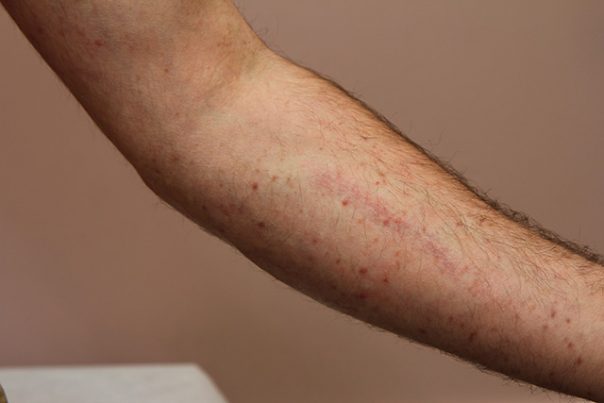
Systemic mastocytosis – causes, side effects and treatments at NaturalPedia.com
Thursday, July 26, 2018 by Michelle Simmons
http://www.naturalpedia.com/systemic-mastocytosis-causes-side-effects-and-treatments-at-naturalpedia-com.html

Systemic mastocytosis is a form of mastocytosis wherein mast cells build up in internal tissues and organs, such as the liver, spleen, bone marrow, and small intestines. The disorder is commonly seen in adults. Systemic mastocytosis is mainly categorized into four groups: indolent systemic mastocytosis (ISM), systemic mastocytosis with an associated hematologic non-mast cell lineage disorder (SM-AHNMD), aggressive systemic mastocytosis (ASM), and mast cell leukemia (MCL).

Known side effects of systemic mastocytosis
The known side effects of systemic mastocytosis include anemia and coagulopathy, abdominal pain, diarrhea, nausea and vomiting, symptoms of gastroesophageal reflux disease (GERD), pruritus and flushing, and anaphylactoid reaction. It may also cause an enlargement of the liver, spleen, or lymph nodes. Other side effects of the disease include lightheadedness, an irregular or unusually rapid beating of the heart, bone pain, headache, and ulcers in the stomach and small intestine.
Body systems harmed by systemic mastocytosis
The body systems damaged by systemic mastocytosis include the integumentary, digestive, cardiovascular, circulatory, skeletal, respiratory, and nervous systems.
List of foods or nutrients that prevent systemic mastocytosis
Foods that are good for mast cells include watercress, pea sprouts, onions, garlic, moringa, holy basil, thyme, tarragon, chamomile, nettle, peppermint, black cumin seed and oil, galangal, ginger, lotus root, turmeric, pomegranate, apples, capers, mangosteens, peaches, Chinese quince, black rice bran, and mung bean sprouts.
Treatments, management plans for systemic mastocytosis
Treatment for mastocytosis, including systemic mastocytosis, includes general measures for histamine release. Patients with systemic mastocytosis should be given special care. Triggering agents in mastocytosis include the following:
- Contrast media, particularly those containing iodine
- Dental and endoscopic procedures
- Emotional factors, such as stress, anxiety, and lack of sleep
- Infectious diseases with fever
- Pharmaceutical drugs
- Physical agents, such as heat and cold, sunlight, sudden changes of temperature, and pressure on skin lesions
- Surgery
- Venoms
- Vaccines
Where to learn more
- Bartonella disease: A misunderstood vector-borne infection, similar to Lyme disease
- Nutrients.news
- DangerousMedicine.com
- BigPharmaNews.com
- Herbs.news
Summary
Systemic mastocytosis is a form of mastocytosis wherein mast cells build up in internal tissues and organs, such as the liver, spleen, bone marrow, and small intestines.
Systemic mastocytosis causes anemia and coagulopathy, abdominal pain, diarrhea, nausea and vomiting, symptoms of gastroesophageal reflux disease (GERD), pruritus and flushing, anaphylactoid reaction, enlargement of the liver, spleen, or lymph nodes, lightheadedness, irregular or unusually rapid beating of the heart, bone pain, headache, and ulcers in the stomach and small intestine.
Systemic mastocytosis harms the integumentary, digestive, cardiovascular, circulatory, skeletal, respiratory, and nervous systems.
Sources include:
Tagged Under: Tags: Systemic mastocytosis





